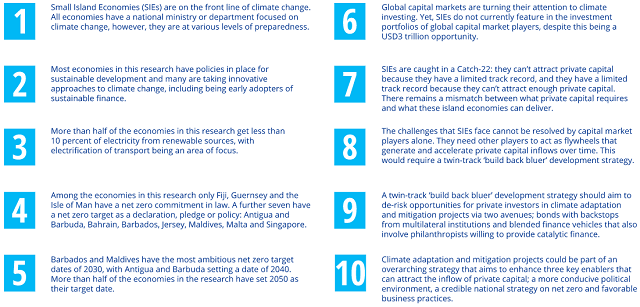Small island economies (SIEs) are at the forefront of climate change. Their economies and livelihoods are already impacted by the effects of a changing climate due to rising sea levels, increasingly frequent and more powerful storms, reduced access to drinking water and damage to ecosystems.
This spotlight edition of the KPMG net zero readiness series highlights SIEs and how they can attract private capital on their journeys toward net zero. It assesses 36 countries and territories on their relative preparedness and ambition to achieve net zero, and their ability to attract private capital to fund the transition to a sustainable economy — while highlighting examples of practices that are already being deployed.

The capital markets can play a key role in funding the net zero ambitions of SIEs. Survey participants — comprised of decision makers at 24 large institutional investors and pension plans together managing USD28.7 trillion in assets — have provided insight into the reasons global investment portfolios are underweight in SIEs and the actions SIEs may take to create change.
Climate change presents an existential risk and living in a small island economy means being more aware than most of the risks and opportunities the marine environment and wider ecological ecosystem bring. Islands are on the climate frontline, and this report presents some of the innovative approaches — and opportunities — governments, business and investors are taking in the race to net zero.

Rachel Decelis
Senior Manager, Environmental, Social & Governance (ESG)
KPMG in Malta
Malta's economy has experienced rapid economic growth over the last few years. However, rapid growth tends to exacerbate environmental and social pressures, and impinge on quality of life. People are realising that whilst GDP growth is important, it does not equate to general well-being. Hence the renewed focus on ESG matters which underpin sustainable economic growth.

Steve Stivala
Director, Advisory - Infrastructure, Public Policy and
Strategy
KPMG in Malta
Malta has a low carbon development strategy based on scientific and economic analysis which sets a clear path towards decarbonisation and to move closer to carbon neutrality by 2050 as per the Paris Agreement. This is surely an important milestone and one which will guide Malta in this transition in various areas identified as key contributors in this pathway in particular renewables, energy-efficiency in buildings and transport and waste management. We are doing so because we want to encourage but also support, in effective ways our community to become more energy efficient and more sustainable in critical daily functions such as the use of household energy and transportation.

Miriam Dalli
Minister for Environment, Energy and Enterprise
Malta
Key takeaways
Small Island Economies (SIEs) are working to respond to the threat of climate change, yet funding remains a challenge for many...
The global capital markets could help to provide SIEs with a solution, though action is needed to enhance their appeal...

Click here to continue reading . . .
The content of this article is intended to provide a general guide to the subject matter. Specialist advice should be sought about your specific circumstances.




